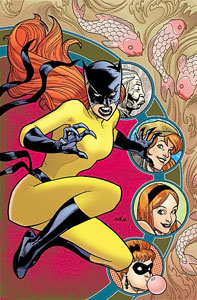Patsy Walker
| Hellcat | |
|---|---|

Hellcat.
Art by Stuart Immonen. |
|
| Publication information | |
| Publisher | Marvel Comics |
| First appearance |
As Patsy Walker: Miss America Magazine #2 (Nov. 1944) As Hellcat: The Avengers #144 (Feb. 1976) |
| Created by |
As Patsy Walker: Otto Binder (writer) Ruth Atkinson (artist) As Hellcat |
| In-story information | |
| Alter ego | Patricia "Patsy" Walker |
| Species | Human (empowered) |
| Team affiliations |
Defenders Avengers Lady Liberators Legion of the Unliving |
| Notable aliases | Hellcat |
| Abilities | Well-trained martial artist and gymnast Psychic senses Force field generation Wrist-mounted retractable claws and grappling hooks |
Hellcat (Patricia "Patsy" Walker) is a fictional superhero appearing in American comic books published by Marvel Comics. She premiered as the star of a teen romantic-comedy series and was later integrated into Marvel superhero franchises such as the Avengers and the Defenders.
Created by Otto Binder and Ruth Atkinson, Patsy Walker first appeared in Miss America Magazine #2 (Nov. 1944), published by Marvel precursor Timely Comics, and became Hellcat in The Avengers #144 (Feb. 1976).
Rachael Taylor plays a version of the character, also called Trish Walker, in the Marvel Cinematic Universe television series Jessica Jones, which premiered on Netflix in November 2015.
Created by writer Otto Binder and artist Ruth Atkinson, Patsy Walker first appeared in Miss America Magazine #2 (cover-dated Nov. 1944), published by Marvel precursor Timely Comics. Redheaded Patsy Walker, her parents Stanley and Betty, her boyfriend Robert "Buzz" Baxter, and her raven-haired friendly rival Hedy Wolfe appeared from the 1940s through 1967 in issues of Miss America, Teen Comics, Girls' Life, and the namesake teen-humor series Patsy Walker and its spin-offs: Patsy and Hedy, Patsy and Her Pals, and the single-issue A Date with Patsy. Attesting to its quiet popularity, Patsy Walker (along with Millie the Model and Kid Colt, Outlaw) was among the very few titles published continuously by Marvel from the 1940s Golden Age of Comic Books, through Marvel's 1950s iteration as Atlas Comics, and into the 1960s Silver Age of Comic Books.
...
Wikipedia
